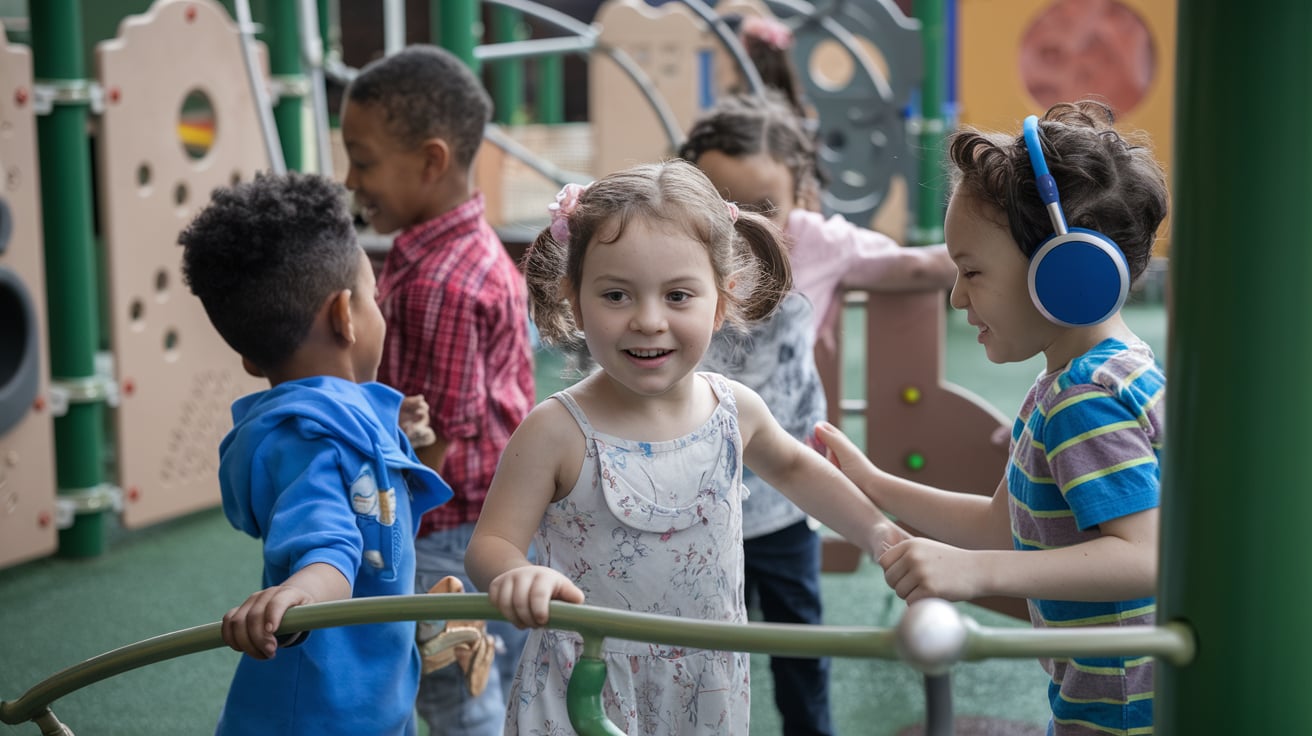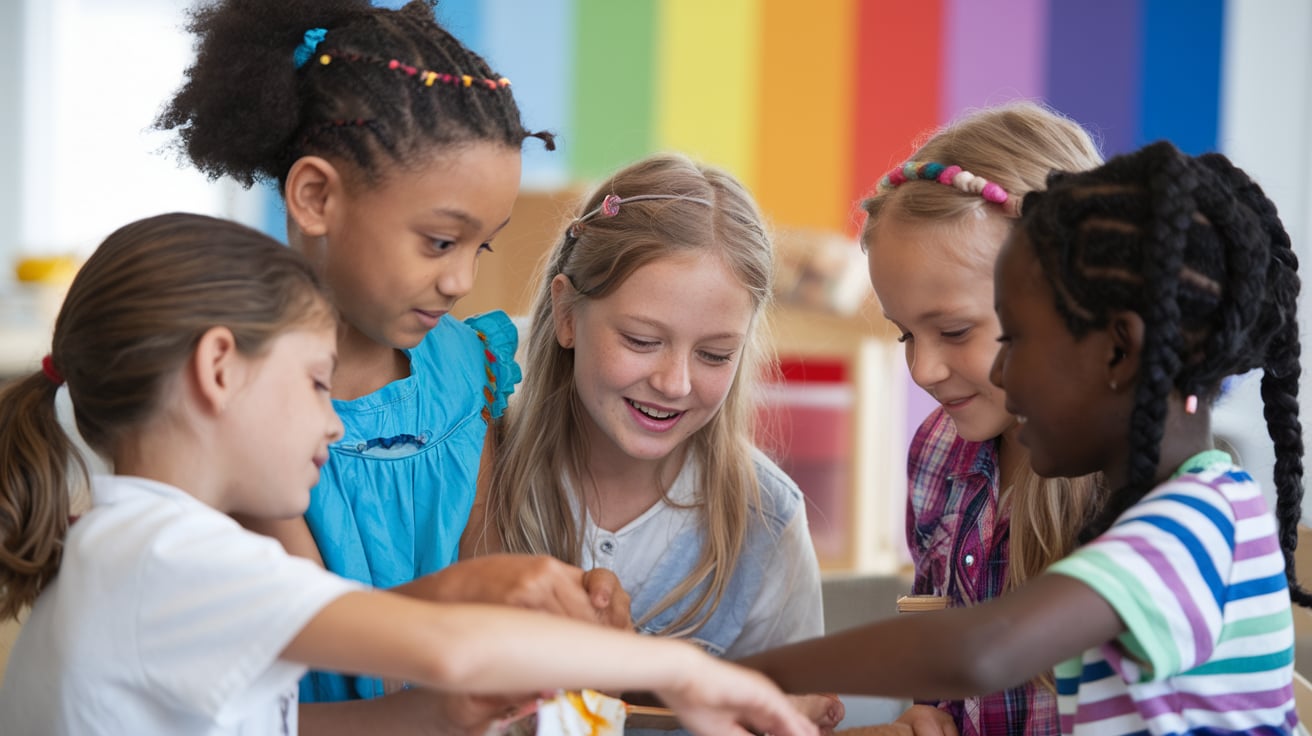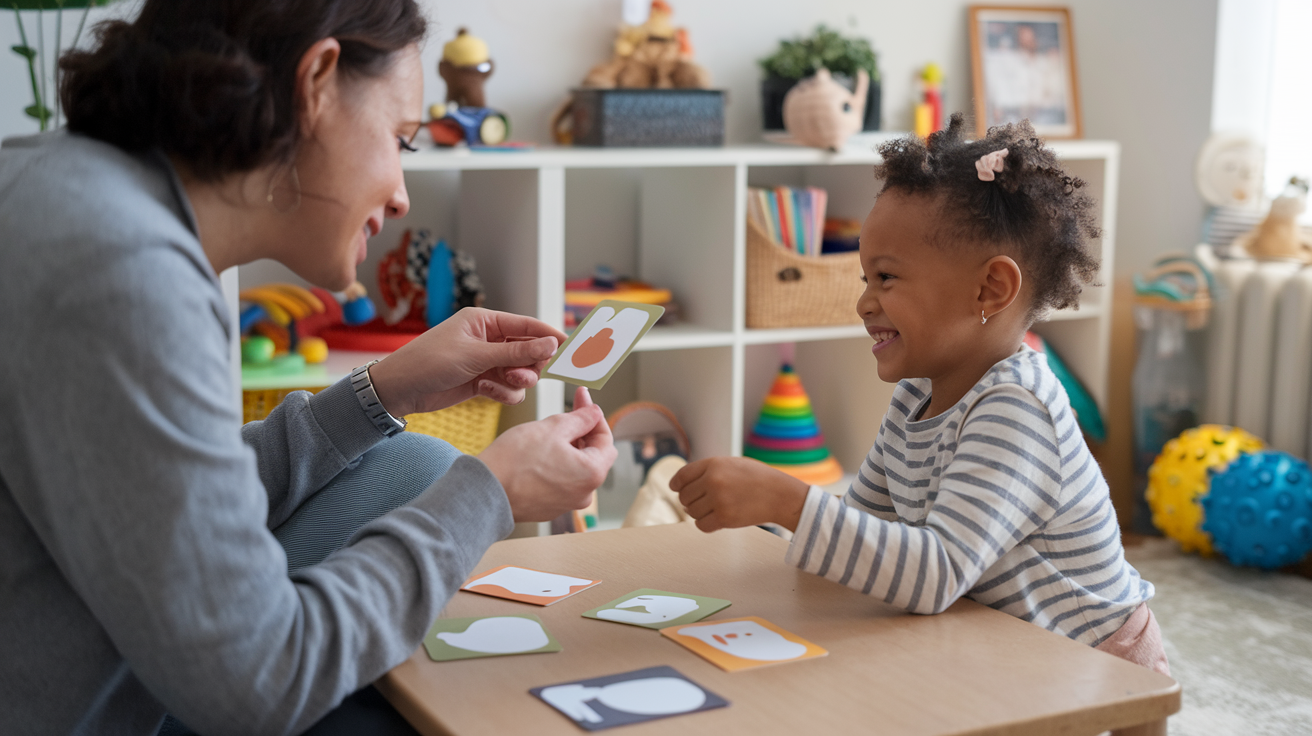Autism can present unique challenges when it comes to social interactions, but friendship is incredibly important for autistic children. In this post we will explore what autism is and how it affects social interactions, discussing the benefits of friendship for autistic children and the challenges they may face in making friends.
Key Takeaways for Autism Support & Social Connections”
- Encourage and support social interactions for your autistic child, even if it may be challenging at times.
- Teach and model social skills to help your child navigate friendships successfully.
- Be open to different types of friendships and seek support from professionals to help your child make meaningful connections.
Understanding Autism & Social Connections
Understanding Autism and Friendship is crucial for parents and caregivers of children on the autism spectrum. It involves recognizing the unique challenges and opportunities that come with fostering social connections for children with autism.
Autistic children may experience difficulties in communication and social interactions, making friendship-building a complex process.
Social skills play a vital role in helping them navigate social situations and develop meaningful connections. By understanding and supporting their emotional vocabulary and communication styles, caregivers can create a safe and inclusive environment for autistic children to thrive in friendships. Involving mental health professionals in the process can provide valuable insights and strategies to enhance social skills and foster healthy relationships. Increasing autism awareness in the community also promotes inclusivity and understanding towards individuals on the spectrum.
What Is Autism? An Easy Overview
Autism, also known as Autism Spectrum Disorder (ASD), is a neurodevelopmental disorder characterized by challenges in social skills, communication, and repetitive behaviors.
ASD’s diagnostic criteria include difficulties in social interaction and communication, as well as restricted, repetitive patterns of behavior, interests, or activities. It is important to understand that autism presents itself across a spectrum, meaning individuals exhibit a wide range of symptoms and severity. For instance, some individuals may have exceptional abilities in specific areas, such as music or mathematics.
It is common for autism to co-occur with other conditions like ADHD (Attention Deficit Hyperactivity Disorder), which can complicate the diagnosis and treatment process. People with ASD often demonstrate unique traits like sensory sensitivities, intense focus on specific topics, and challenges in understanding and expressing emotions.
How Does Autism Impact Social Interactions?
Autism can impact social interactions by affecting a child’s ability to understand social cues, engage in reciprocal communication, and navigate complex social environments.
Individuals with autism often experience challenges related to sensory sensitivities, such as being overwhelmed by loud noises or bright lights, which can make social interactions uncomfortable or even distressing. Difficulties with theory of mind may lead to misunderstandings in social situations, as individuals with autism may struggle to interpret and predict the thoughts and feelings of others. For example, a child with autism may not recognize when someone is upset based on facial expressions or body language.
Observational skills can be impacted, making it challenging for individuals with autism to pick up on subtle social cues, like changes in tone of voice or nonverbal communication. These difficulties can make it harder to engage in conversations naturally, as they may miss important contextual clues or struggle to maintain eye contact.
Why Are Friendships Vital for Autistic Children?
Friendship holds significant importance for autistic children as it provides opportunities for social growth, emotional connection, and a sense of belonging.
Through friendships, autistic children can enhance their social skills by learning valuable communication strategies, understanding social cues, and practicing cooperation.
Engaging in friendships allows them to develop their emotional vocabulary as they express feelings, empathy, and understand others’ emotions.
Friendships also contribute to the resilience of autistic children, providing support during challenging times and helping them navigate social situations with confidence.
Making friends can pose challenges for autistic children, such as difficulty in initiating conversations, understanding social boundaries, and interpreting non-verbal cues.
The Benefits of Social Connections in Autism Support
Friendship offers autistic children opportunities for social skill development, emotional support, learning through play, and a sense of community and belonging.
Having friends can greatly enhance an autistic child’s education by providing real-world interactions that promote communication and understanding. Through shared activities and experiences, these children can learn essential social cues, emotional regulation, and problem-solving skills. For instance, engaging in imaginary play with friends can encourage creativity and boost cognitive development.
Friendships serve as a valuable support system for autistic children, helping them cope with the challenges they may face. By sharing their struggles with trusted friends, these children can find comfort and encouragement during difficult times, such as overcoming fears or dealing with sensory sensitivities. In this way, friendships play a crucial role in building resilience and fostering mental well-being.
Challenges of Making Friends for Autistic Children
Autistic children may face challenges in making friends due to difficulties in social communication, understanding social norms, navigating conflicts, and initiating interactions.
These hurdles can lead to feelings of isolation and exclusion, making it harder for autistic children to form meaningful connections with peers. The nuances of social cues and unwritten rules often pose significant barriers, causing misunderstandings and potential conflict. To overcome these challenges, building social skills through targeted interventions and structured social programs can be highly beneficial. Encouraging positive communication, teaching problem-solving techniques, and promoting empathy can help autistic children develop healthier relationships. Participation in buddy programs and inclusive activities can create opportunities for positive social interactions and friendship building.
Supporting Your Child with Autism: Tips for Building Social Connections
 Supporting your autistic child in making friends involves nurturing their social skills, creating opportunities for social interactions, modeling positive behavior, and seeking guidance from professionals.
Supporting your autistic child in making friends involves nurturing their social skills, creating opportunities for social interactions, modeling positive behavior, and seeking guidance from professionals.
One practical strategy for parents and caregivers is to incorporate social skills training into daily routines, such as teaching the concept of turn-taking during playtime or practicing greetings with family members. This consistent reinforcement helps in building a foundation for social interactions.
- Facilitating structured social opportunities, like joining inclusive community programs or organizing playdates with peers who share similar interests, can provide a safe space for autistic children to practice their social skills in a supportive environment.
Role modeling positive behaviors is crucial; parents can demonstrate effective communication, empathy, and problem-solving skills, which autistic children can observe and learn from. It’s essential to praise and reinforce desirable social behaviors to encourage their development.
Collaborating with professionals, such as therapists, educators, or support groups specializing in autism, can offer tailored strategies and interventions to address the unique social challenges faced by autistic children. This teamwork approach can provide comprehensive support and guidance for both the child and the family.
Encouraging Positive Social Interactions
Encouraging social interactions for autistic children involves exposing them to social groups, engaging in leisure activities, creating autism-friendly environments, and aligning support with their Education, Health, and Care Plans (EHCP) or Individual Education Plans (IEP).
One effective way to promote social interactions in autistic children is to incorporate group activities where they can engage with peers in a structured setting. By participating in group games, sports, or art projects, these children can develop important social skills while having fun and building friendships.
Introducing them to autism-friendly spaces, such as sensory-friendly parks or inclusive community centers, can create environments that cater to their specific needs and encourage interaction with others in a comfortable setting.
Teaching Social Skills with Autism Support Tools
Teaching social skills to autistic children involves working on communication techniques, emotional vocabulary development, utilizing tools like Comic Strip Conversations, and enhancing understanding of theory of mind concepts.
One effective method in improving communication abilities is through the use of structured interaction scenarios that facilitate practice and reinforcement.
Expanding emotional vocabularies can be achieved by incorporating emotion recognition activities and teaching emotional regulation techniques.
Utilizing visual aids such as Comic Strip Conversations can help in explaining social situations and promoting perspective-taking skills in a concrete and accessible way.
Enhancing theory of mind comprehension involves teaching about others’ perspectives and beliefs through storytelling and role-playing exercises.
Creating Opportunities for Meaningful Friendships
Creating opportunities for friendship involves finding inclusive activities, teaching boundaries and effective communication, and exploring avenues like participation in programs such as the Special Olympics.
One way to help autistic children develop friendships is by encouraging them to engage in activities that are inclusive and welcoming. Whether it’s joining a sports team, art class, or a social club, these environments can provide a sense of belonging and connection.
Setting clear boundaries is also crucial. Teaching the child how to express their needs and preferences respectfully can help them navigate social interactions more effectively and foster positive relationships.
Improving communication skills through activities like role-playing, social stories, or social skills groups can enhance the child’s ability to initiate and maintain conversations, understand social cues, and express emotions.
Considering involvement in community programs like the Special Olympics can be a great opportunity for autistic children to interact with peers in a supportive and inclusive environment, fostering friendships based on shared interests and experiences.
Being a Role Model in Social Connections
Being a role model for your autistic child involves demonstrating positive behaviors, fostering a supportive environment that values different types of friendships, and leveraging community support networks.
By showing your child how to engage in kind and respectful interactions, you set a powerful example for them to follow. Children often learn best through observation and imitation, making your role modeling crucial in shaping their social skills. Moreover, creating a supportive environment that celebrates all forms of friendship can help your child feel accepted and confident in forming meaningful connections.
Tapping into community support networks can offer your child opportunities to interact with peers in safe and structured settings. These connections outside the family unit can provide valuable social experiences and reinforce the social skills they are learning at home.
Finding Autism Support: Expert Guidance & Community Resources
Seeking support from professionals involves collaborating with experts, exploring buddy programs, and establishing a circle of friends to provide comprehensive assistance in fostering meaningful social relationships for your autistic child.
Parents and caregivers can benefit greatly from the expertise centers, where specialized programs cater to the unique needs of autistic individuals. By tapping into resources like the buddy programs offered, children with autism can build connections with peers in a supportive environment, boosting their social skills and fostering inclusivity.
Forming a tight-knit circle of friends who understand and embrace neurodiversity can create a safe space for your child to thrive socially.
Practical Tips for Parents and Caregivers
Practical tips for parents and caregivers of autistic children include understanding your child’s interests, engaging in inclusive activities, teaching boundaries and effective communication skills, and fostering a positive and supportive environment for social growth.
Regarding understanding your child’s interests, take note of what brings them joy and captures their attention. By focusing on these individual interests, you can tailor activities that cater to their specific likes and strengths. Participating in inclusive activities not only provides opportunities for social interaction but also encourages understanding and acceptance among peers. Teaching boundaries and effective communication skills involves clear and consistent guidance, helping your child navigate social interactions with confidence.
Joining Special Interest Groups for Social Growth
Understanding your autistic child’s interests requires active listening, building emotional vocabulary, and seeking guidance from mental health professionals when necessary.
By actively listening to your child, you can pick up on cues about what truly engages them, allowing you to support and encourage those passions.
Encouraging the development of emotional vocabulary plays a crucial role in helping autistic children express their feelings and needs.
When collaborating with mental health professionals, you gain valuable insights and tailored strategies to create a holistic care plan that fosters your child’s overall well-being.
Find Inclusive Activities
Finding inclusive activities involves exploring educational and leisure opportunities that align with autistic children’s interests and accommodate their individualized plans such as Education, Health, and Care Plans (EHCP) or Individual Education Plans (IEP).
Depending on their unique preferences, activities can range from sensory-friendly outings to art classes, music therapy sessions, or group sports that promote social interaction.
Parents and caregivers can work closely with teachers and therapists to design stimulating activities that reinforce learning objectives mentioned in the EHCP or IEP.
Engaging in collaborative games or puzzles can enhance cognitive skills, while nature walks or visits to museums foster their creativity and exploration. By incorporating their individualized goals, they can develop confidence and autonomy in a supportive environment.
Teach Boundaries and Communication
Teaching boundaries and effective communication to autistic children involves enhancing their understanding of social norms, emotional expression, and managing mistakes in social interactions.
One effective strategy is to use visual cues or social stories to help children with autism learn about personal space and appropriate behavior in different social settings.
Practicing role-playing scenarios can provide a safe environment for them to explore different social cues and responses.
Encouraging the use of emotional vocabulary and providing examples of different emotions can aid in expanding their ability to express feelings and understand others’ emotions.
Be Open to Different Types of Friendships
Being open to different types of friendships for your autistic child involves embracing diverse social connections, supporting their participation in social groups, and fostering environments that are inclusive and autism-friendly.
Encouraging inclusive friendships can not only enrich your child’s social experiences but also play a vital role in their overall development. By embracing and celebrating the unique connections your child forms, you create a supportive environment that values diversity and fosters acceptance. It’s important to encourage interactions with peers who appreciate and understand your child’s individual strengths and differences, promoting a sense of belonging and positive social engagement.
Creating opportunities for your child to engage with a variety of social groups, whether through school, extracurricular activities, or community events, can help them develop crucial social skills and build lasting relationships. By advocating for inclusive spaces and promoting acceptance of diverse friendships, you give the power to your child to navigate social interactions with confidence and understanding.
Foster a Positive and Supportive Environment
Fostering a positive and supportive environment involves nurturing conflict resolution skills, leveraging community support networks, and establishing a circle of friends who provide encouragement and understanding for your autistic child.
By creating this nurturing environment, autistic children are given the tools to navigate social interactions with more ease and confidence. This setting helps them develop essential skills to address conflicts constructively, fostering better communication and relationships both at home and in the broader community. Tapping into the available community support resources can offer a wealth of knowledge and assistance, ranging from educational programs to therapy services, enriching the overall support system for the child. Encouraging the formation of supportive friendships within a trusted circle can provide emotional sustenance and companionship, bolstering the child’s mental well-being and resilience.
Real-life Examples of Autistic Children Making Friends
Real-life examples showcase how autistic children can make friends through joining social groups, participating in sports teams, volunteering in the community, attending social skills groups, and forming connections online.
For instance, in structured social skills groups, children on the autism spectrum learn to navigate social cues and build relationships in a supportive environment. Similarly, engaging in volunteer activities can provide opportunities for autistic children to connect with others who share common interests and values, fostering friendships that extend beyond the activity itself.
In sports environments, teamwork and shared objectives create a sense of camaraderie that transcends individual differences, enabling autistic children to bond over their mutual love for the game.
Online platforms offer a unique avenue for connection, where autistic children can find like-minded peers, share experiences, and engage in conversations that spark friendships based on shared passions and experiences.
Joining a Special Interest Group
Joining a special interest group can provide autistic children with a platform to engage in social skills development, pursue leisure activities aligned with their interests, and receive guidance from mental health professionals when needed.
These groups create a supportive environment where children can connect with others facing similar challenges, fostering a sense of belonging and understanding. Engaging in group activities can boost their confidence and communication skills, as they practice interactions in a safe and welcoming setting.
Through participation in these groups, children can explore their passions and talents, discovering new hobbies or refining existing skills. Special interest groups cater to individual preferences, accommodating diverse interests from art and music to science and technology.
Participating in a Sports Team
Participating in a sports team enables autistic children to engage in social interactions, enhance communication skills, and build connections through shared experiences, with the potential for integrating buddy programs for additional support.
Sports team participation offers a structured environment where autistic children have the opportunity to develop crucial social skills, such as turn-taking, empathy, and conflict resolution. In the context of a team setting, these children learn the significance of collaboration and teamwork, fostering a sense of belonging and acceptance.
The friendships formed within a sports team setting can lead to lasting relationships that extend beyond the field or court. Autistic children experience camaraderie and mutual support, which can significantly enhance their self-esteem and overall well-being.
Incorporating buddy programs into sports teams further enhances social integration by pairing autistic children with peers who provide guidance, encouragement, and understanding. These programs not only promote inclusivity but also cultivate a sense of community and emotional support among all participants.
Volunteering in the Community
Volunteering in the community allows autistic children to contribute meaningfully, access community support networks like those led by professionals, and expand their circle of friends for social enrichment.
One of the major advantages of community volunteerism for autistic children is the opportunity for skill development. Through volunteering, they can enhance their communication skills, learn new tasks, and build confidence in their abilities. This practical experience can lead to increased independence and provide a sense of accomplishment.
Community volunteerism offers a chance for autistic children to engage with a diverse group of people, fostering a sense of belonging and acceptance. They can learn from others and develop valuable social skills through interaction with different individuals. Mentorship from professionals provides them with guidance, expertise, and inspiration to excel in various areas of their lives.
Attending Social Skills Groups
Attending social skills groups offers autistic children structured settings for practicing social interactions, learning conflict resolution techniques, and aligning support with their Individualized Educational Plans for personalized growth.
Participation in social skills groups provides a safe space where autistic children can develop their interpersonal skills in a supportive environment. By engaging in group activities, these children practice essential communication strategies and emotional regulation methods that are crucial for navigating social interactions.
These groups offer a platform for conflict management practice, allowing children to handle disagreements and challenges effectively. This hands-on experience helps them build confidence and resilience in real-life situations, preparing them for various social scenarios they may encounter.
Making Friends Online
Making friends online offers autistic children virtual avenues for social interaction, community support, and connections facilitated by platforms like the Georgia Autism Center, fostering a sense of belonging and companionship.
One of the significant advantages of online friendships for autistic children is the accessibility it provides, enabling them to engage in social interactions from the comfort of their own space. This virtual environment can help reduce the anxiety that may come with face-to-face interactions, allowing these children to build relationships at their own pace.
Through networked communities like the Georgia Autism Center, these children can find a supportive network of peers who understand and share similar experiences, creating a sense of belonging and camaraderie that contributes to their emotional well-being. In these online spaces, autistic children can connect with others, fostering relationships that may not have been possible otherwise, thus breaking barriers to social inclusivity and engagement.
For more in-depth guidance on helping your autistic child navigate social interactions and form meaningful friendships, check out Ausome Connections. This book offers practical strategies, real-life examples, and valuable tools designed to foster growth and confidence in autistic children. Whether you’re a parent, caregiver, or educator, Ausome Connections is your trusted resource for boosting social skills and building strong, lasting connections.
Frequently Asked Questions About Social Connections & Autism Support
What is the best way to help my autistic child make friends?
The best way to help your autistic child make friends is to focus on their interests and strengths. Encourage them to join clubs or activities related to their interests, where they can meet other children with similar interests. This will help them feel more comfortable and confident in social situations.
How can I support my child in navigating social interactions?
One way to support your child in navigating social interactions is to use visual aids, such as social stories or picture schedules, to help them understand the expectations and social cues in different situations. You can also practice role-playing with your child to help them learn and practice social skills.
What can I do to help my child cope with rejection from peers?
It can be difficult for any child, especially those on the autism spectrum, to cope with rejection from peers. As a parent, you can provide emotional support and reassurance to your child. You can also help them find activities and groups where they feel included and supported.
How can I teach my child to initiate conversation with others?
A helpful way to teach your child to initiate conversation with others is to practice with them at home. You can role-play different scenarios and teach them how to ask questions and listen to others. You can also provide prompts or visual aids to help them start conversations in real-life situations.
What are some strategies for helping my child maintain friendships?
One strategy for helping your child maintain friendships is to encourage them to participate in activities with their friends regularly. You can also help them understand the importance of compromise and empathy in relationships. Additionally, you can provide guidance and support when conflicts arise with friends.
How can I involve my child’s classmates in supporting their social development?
One way to involve your child’s classmates in supporting their social development is to educate them about autism and your child’s specific needs. This can help them better understand and include your child in social situations. You can also work with the teacher to create a supportive and inclusive classroom environment.


